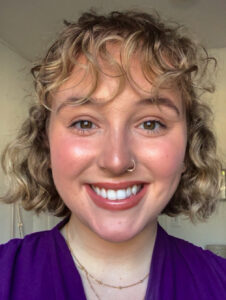Hannah Mathieu: Seeking solutions to Maine’s food waste challenges
This UMaine junior environmental science and English major works with stakeholders to raise awareness and inspire action on food waste.

Why are you interested in food waste and/or sustainable solutions?
I am interested in food waste because food is something that we all have to have access to, and reducing food waste not only benefits our planet, but it also benefits our communities by reducing food insecurity.
How did you get involved in the Mitchell Center food waste project?
A friend and I wanted to try to start a composting project in the Orono area after realizing that there was nowhere in Orono to take our own food waste. After connecting with a few professors at UMaine, I was told about Susanne Lee’s project, and she reached out to me to see if I would be interested in being a part of it.
What do you feel are the most important academic or personal skills that you bring to your multidisciplinary student research team?
I think that the most important skill that I bring to Food Rescue MAINE is my aptitude for good communication. Working on a multidisciplinary team means that we need to be able to communicate with very different knowledge bases. As an English and environmental science major, I need to be able to clearly communicate complex ideas, and this skill has been incredibly helpful at Food Rescue MAINE.
What are the most important things that you are learning through your participation on this project?
I think that the most important thing that I have learned from this project is working with outside stakeholders. While writing has always been my strong suit, the idea of working with stakeholders over zoom meetings and in-person definitely made me nervous at first. However, I have learned that as a student, I am not expected to be an expert, and rather that these stakeholder meetings are valuable learning experiences, and help me to build a network in my field.
How is working on this project enriching your studies, or vice versa?
This internship has been an amazing opportunity to use both my English and environmental science majors at the same time. I get to be a part of a sustainability-focused project, and use the skills that I have gained from my English major to communicate what we are doing with our stakeholders.
How do you like to spend your free time?
Free time is not something I have a ton of, but when I do I like to cook, go hiking or get a good workout in, or read a book and stay in.
